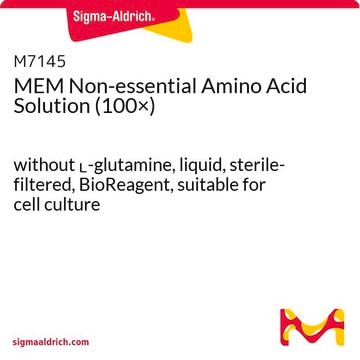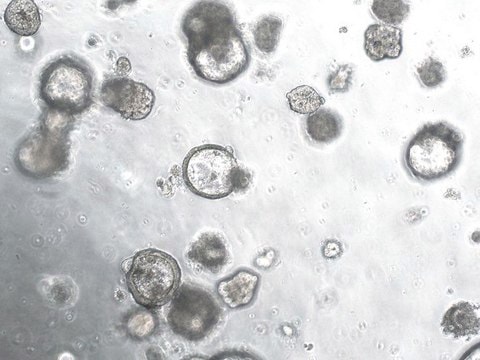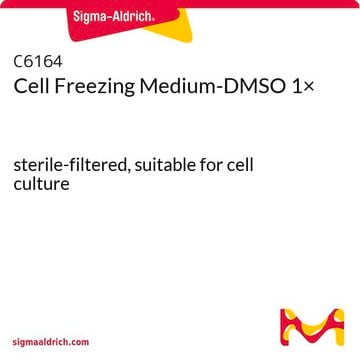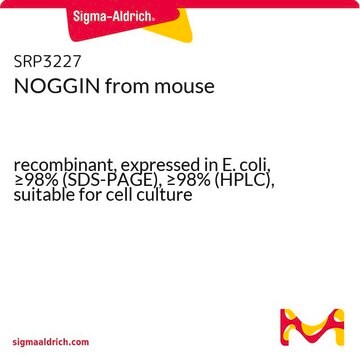GF154
Wnt-3a, recombinant mouse
The recombinant murine Wnt-3a protein is a monomeric glycoprotein containing 328 amino acid residues.
Synonym(s):
Mouse Wnt-3a, Recombinant Wnt-3a
Sign Into View Organizational & Contract Pricing
All Photos(1)
About This Item
UNSPSC Code:
12352202
eCl@ss:
32160405
NACRES:
NA.75
Recommended Products
biological source
mouse
Quality Level
mol wt
Mw 38.0-41.0 kDa
technique(s)
cell culture | mammalian: suitable
impurities
<0.1 ng/μg endotoxin (1EU/μg)
input
sample type: mouse embryonic stem cell(s)
sample type induced pluripotent stem cell(s)
UniProt accession no.
shipped in
dry ice
Gene Information
mouse ... WNT3A(22416)
General description
Product Source: Mouse L cells expressing full length Wnt3a.
Recombinant murine Wnt-3a is a monomeric glycoprotein containing 328 amino acid residues. When analyzed by SDS-PAGE under non-reducing conditions, the murine Wnt-3a migrates at an apparent molecular weight of approximately 38.0-41.0 kDa.
Wnt-3a signalling has been implicated in the control of differentiation of stem cells. Wnt proteins bind to receptors of the Frizzled family in conjunction with a coreceptor of the low-density lipoprotein receptor-related protein family (LRP-5 or -6), or the Ryk atypical receptor tyrosine kinase. Wnt proteins have been shown to regulate cell-to-cell interactions during embryogenesis, more specifically regulating mesoderm differentiation and osteogenesis. Wnt proteins have also been shown to have putative roles in the regulation of adult stem cells.
Wnt-3a signalling has been implicated in the control of differentiation of stem cells. Wnt proteins bind to receptors of the Frizzled family in conjunction with a coreceptor of the low-density lipoprotein receptor-related protein family (LRP-5 or -6), or the Ryk atypical receptor tyrosine kinase. Wnt proteins have been shown to regulate cell-to-cell interactions during embryogenesis, more specifically regulating mesoderm differentiation and osteogenesis. Wnt proteins have also been shown to have putative roles in the regulation of adult stem cells.
Application
Research Category
Stem Cell Research
Stem Cell Research
The recombinant murine Wnt-3a protein is a monomeric glycoprotein containing 328 amino acid residues.
Linkage
Replaces: GF160
Physical form
Lyophilized from a solution containing PBS and 1.0% CHAPS buffer.
Storage and Stability
Maintain the lyophilized material at -20°C up to six months from date of receipt. Resuspend in sterile water to a concentration of 100µg/mL. Reconstituted Wnt3a should be stored in single use aliquots at -80°C for up to three months. Avoid repeated freeze/thaw cycles. During shipment, some amount of product will occasionally dispersed. It’s recommended to gently tape the vial on the hard surface before reconstitution.
Analysis Note
Specific Activity: Wnt3a protein has been shown to be bioactive as determined by TCF/LEF-luciferase reporter. The ED50 for this effect is typically <250 ng/mL. Optimal concentrations should be determined for each application.
Disclaimer
Unless otherwise stated in our catalog or other company documentation accompanying the product(s), our products are intended for research use only and are not to be used for any other purpose, which includes but is not limited to, unauthorized commercial uses, in vitro diagnostic uses, ex vivo or in vivo therapeutic uses or any type of consumption or application to humans or animals.
Storage Class Code
11 - Combustible Solids
WGK
WGK 2
Certificates of Analysis (COA)
Search for Certificates of Analysis (COA) by entering the products Lot/Batch Number. Lot and Batch Numbers can be found on a product’s label following the words ‘Lot’ or ‘Batch’.
Already Own This Product?
Find documentation for the products that you have recently purchased in the Document Library.
Gerald Schwank et al.
Methods in molecular biology (Clifton, N.J.), 1422, 3-11 (2016-06-02)
The CRISPR/Cas9 system is an RNA-guided genome-editing tool that has been recently developed based on the bacterial CRISPR-Cas immune defense system. Due to its versatility and simplicity, it rapidly became the method of choice for genome editing in various biological
Shreyasi Maity et al.
Frontiers in immunology, 13, 818266-818266 (2022-02-25)
Visceral leishmaniasis, caused by L. donovani infection is fatal if left untreated. The intrinsic complexity of visceral leishmaniasis complicated further by the increasing emergence of drug resistant L. donovani strains warrants fresh investigations into host defense schemes that counter infections.
Our team of scientists has experience in all areas of research including Life Science, Material Science, Chemical Synthesis, Chromatography, Analytical and many others.
Contact Technical Service







